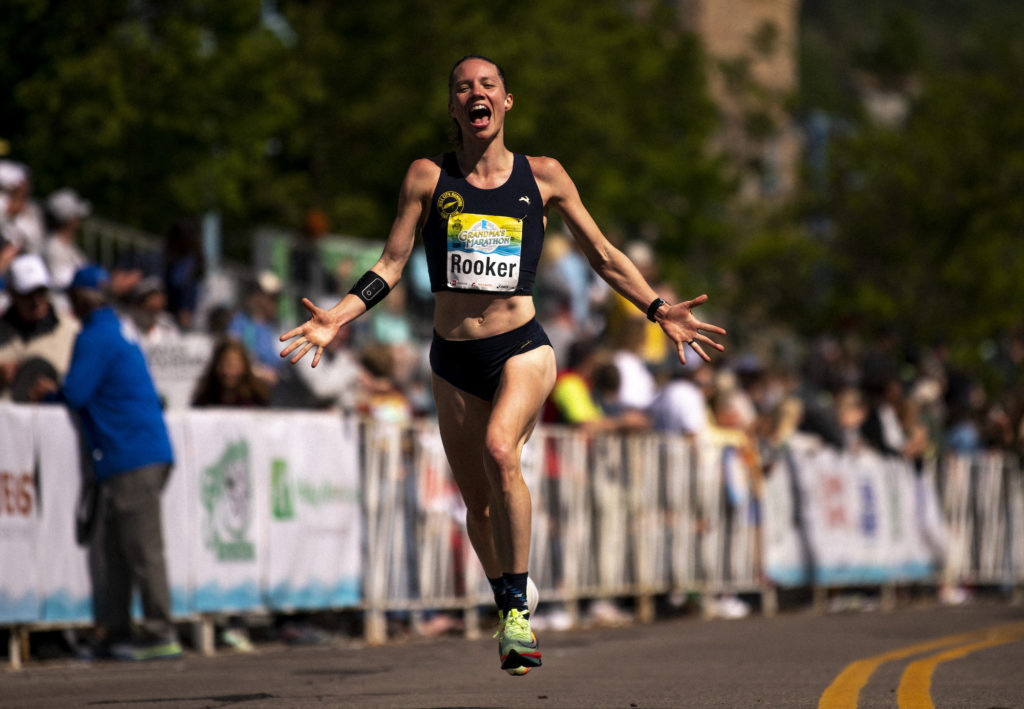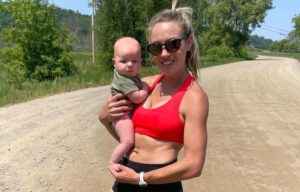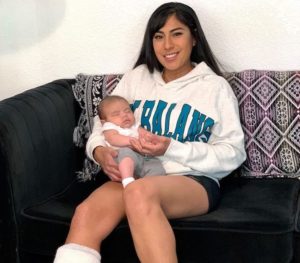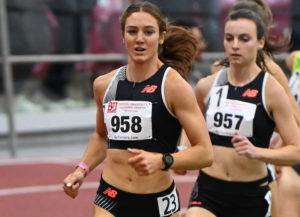
By Alison Wade
At last month’s Grandma’s Marathon, Gabi Rooker ran a 20-minute personal best. That kind of improvement isn’t all that unusual in a second marathon, as one figures out how to train, pace, and fuel. What makes Rooker’s accomplishment remarkable is that she went from 2:54:57, which made her an excellent local runner, to 2:34:57 (2:34:59 gun time), which qualified her to compete at the 2024 U.S. Olympic Marathon Trials. At the time, only 25 American women had run faster in 2022.
Part of the reason Rooker, 34, is improving so dramatically is that she’s relatively new to the sport. She did some running off and on throughout her twenties, but Rooker, a Minneapolis resident, only started running consistently four or five years ago. When she ran 1:06:02 at the 2018 Twin Cities 10 Mile and placed well in her age group, she realized that she had some talent for the sport. Her husband, Alex Rooker, who was a college track & field athlete turned cyclist, began coaching her. By the fall of 2019, she lowered her 10-mile time to 1:02:06 and started to think about running her first marathon.
Athletic beginnings
This is hardly a couch-to-elite-runner story, though. Rooker was a very serious athlete growing up, but her sport of choice was gymnastics. She began in the sport when she was only three years old and eventually built up to 20 hours per week of training. “It was my whole life,” Rooker said. She aspired to be a Division I college gymnast, but a series of injuries as she was going through puberty, including breaking both of her arms, caused her to scale back her expectations and focus more on enjoying the sport.
“I definitely learned a ton of focus and discipline and lessons about myself and perseverance,” Rooker said. “But I certainly think that there are some parts of the sport that needed to evolve and change. I’m not involved in it now, but I hope those things have changed. Not to even get into any of the abuse and toxicity, but even just letting kids participate in other sports and things like that. At the same time, I think I am dedicated and driven in all aspects of my life because of gymnastics.”
Rooker took her senior year of high school away from gymnastics and went out for the track team, where her events of choice were the 100m, 200m, and 400m—nearly as far as one can get from the marathon and still be in the same sport. She returned to gymnastics for her college years, and she won three Division III individual national titles and three team national titles competing for the University of Wisconsin–La Crosse. And, as she had hoped, she had a lot of fun doing it.
“Our coach (Barbara Gibson) was fantastic,” she said. “We had a ton of success, but her focus was mostly on teaching young women to become self confident, strong, and leaders in whatever their life looks like after college.”
Gymnastics is a tough sport to continue with post-collegiately, so Rooker knew that she would be leaving it behind when she graduated in 2010, and it took awhile for her to figure out other ways she enjoyed staying active.
Becoming a marathoner
Rooker hoped to run her first marathon in 2020, but those plans were thwarted by the pandemic. She works as a physician assistant in internal medicine and ended up taking care of a lot of Covid patients. She was never aware of having contracted Covid, but in May 2020, her antibody test came back positive, so she spent the remainder of the year donating plasma to help others fight Covid.
Though her work was challenging and stressful at times during 2020, like many people, Rooker had more down time outside of work, and she used some of it to increase her mileage. By the time Grandma’s Marathon returned in June of 2021, she was ready. She thought breaking 3:00 would be a good goal for her first marathon, and it went even better than she expected. She went through halfway in 1:29:18 and ran the second half in 1:25:39. It was that race that got her thinking about going after the Olympic Marathon Trials qualifying time.
She knew the 2024 standard would likely be faster than the 2020 standard of 2:45:00, but she felt “a little bit gutted” when she learned last December that it had dropped eight minutes, to 2:37:00. An 18-minute personal best seemed like a tall order. She processed the news by going for a run with her Mill City Running teammate Kim Horner, who was also chasing the standard. “We were commiserating and it was kind of like, ‘Okay we knew we had to run faster than we have, and now we just have to run even faster than that.’”
Rooker’s buildup for Grandma’s in 2022 went about as smoothly as it could have. “I certainly had days that felt frustrating and tough—and exhausting—but the buildup itself, looking back, was really consistent,” she said. She does most of her training alone because her work schedule—seven days on followed by seven days off—often makes it hard to coordinate with other runners. And at times, that’s for the best, because she’s a strong believer in taking her easy days really easy. (Her easy pace has gotten progressively faster, though, and it’s currently around 8:00/mile.) Rooker saves her hardest training for the weeks she has off of work, and during this buildup, she hit her first 100-mile week.
Though Rooker and Horner run together less than one would expect, given their proximity and shared goals, they text each other often to discuss how training is going, fueling concerns, and other topics. ”We’re just both a big sounding board for each other,” Rooker said. “It’s a very mutually positive relationship both as teammates and then as good friends as well.”
At the end of April, Rooker raced the Eugene Half Marathon, where she had the opportunity to run with Shalane Flanagan, who was pacing a group of runners. (Flanagan mentioned on a podcast that she is working on a project to help women qualify for the 2024 Olympic Marathon Trials.) “I thought I might as well run with her because it was going to be a once-in-a-lifetime opportunity,” Rooker said. She hung with Flanagan’s pack until late in the race, then picked up the pace and finished in a personal best of 1:17:32.
That time is unlikely to last for long, though, because at Grandma’s, Rooker went through halfway in 1:18:12 and ran a big negative split, with a 1:16:45 second half. And Horner hit the Trials qualifying time as well, running 2:36:41, which made it an extra special day.
Rooker is still taking it easy in her training as she recovers, and this summer, she’ll focus on shorter races. She’s hoping to improve her 16:55.24 5,000m personal best at the Tracksmith 5000 in August and bring some of her other personal bests down. Then she plans to run the California International Marathon in December. It’s too soon for her to think about goals for the 2024 Trials—the event’s host city and date haven’t even been announced yet—but at some point she would like to run under 2:29:30, the 2020 Olympic standard. Rooker is only just beginning to learn how much potential she has in the sport, and she’s relishing the challenge.
“In gymnastics, you do this thing thousands and thousands of times, as perfectly as you can and then the change is going from practice to the meet,” Rooker said. “But you’re still on a four-inch beam that’s four feet tall. Everything else is controlled, except you and your mindset.
“And then with running, it’s the opposite. You do a huge amount of training but there might be wind on the day of the race, or rain, or you might have an upset stomach. You’re trying to do something you’ve never done before. I’m trying to run faster and stronger than I’ve ever run before and that is scary, but it’s such a cool challenge, because you have to let go of so many control factors and be okay with the race day that you get and just throw down what you have.”





